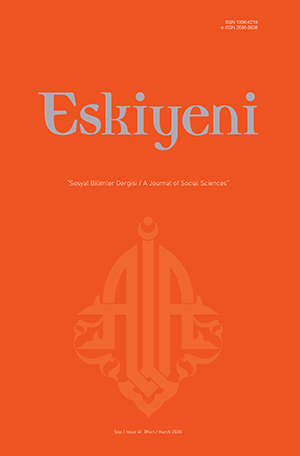Türkiye’de Yapılan ‘Dinî Başa Çıkma’ Konulu Araştırmalar Hakkında Bir Değerlendirme
An Evaluation of Research on ‘Religious Coping’in Turkey
Author(s): Süleyman AbanozSubject(s): Theology and Religion, Islam studies
Published by: Anadolu İlahiyat Akademisi
Keywords: Religious Psychology; Religious coping; Spiritual counseling and guidance;
Summary/Abstract: This research deals with the studies of “Religious coping”, which were carried out in Turkey between 2001-2019. Coping can be defined as a cognitive and behavioral effort to diminish the chaos and the psychological pressure caused by stressful situations. People often confront unple-asant event and situations disturbing them psychologically and physiologically. Every person wants to overcome this kind of nuisances in order to protect his/her psychological and physiolo-gical health. In order to manage these unpleasant situations, they employ mainly two strategies called problem-focused and emotion-focused strategy. Those who use the first strategy try to solve the problem by simply focusing on the problem itself while those who use the second stra-tegy intend to get rid of the problem by altering the way of their perception of the problem. In this sense, religion offers the problem-focused strategy to give courage and make people see life more worthwhile. On the other hand, it offers the emotion-focused strategy so that people bare, be patient and give meaning to those unpleasant events. The purpose of this research is to examine the studies related to religious coping strategies in terms of variables, scales employed and sample groups and to determine the tendencies through descriptive analysis. In this regard, the quality and quantity of the studies carried out between 2001-2019 in Turkey are also to be found out. Although the religious coping strategies had been used since early times, it was not until the end of the 20th century that “the religious coping” was defined and examined scientifically. Pargament, one of the chief pioneers, developed the very first scales and conducted studies using them. The first studies in Turkey started in 2001 after these scales were translated into Turkish and their validity and reliability were tested. Since then, 89 studies, 76 of which are original and 13 of which are based on a dissertation, have been perfor-med. 35 of the original studies are M.A thesis, 11 of them PhD, 27 essays, 3 books and book chap-ters. In one of these studies, a prayer inventory was used, in the other one a scale development was performed and four of them are done theoretically. 70 studies are classified as a field study. Except for the 2 studies which do not contain any information regarding the scale used, 21 studies were conducted through interviews, 47 studies used a religious coping scale. One of these scales consisting of 26 items was used by two researchers in their own studies who developed this scale in 2011 in Diyarbakır. The first of the four scales developed by adapting the Pargament’s scales to Turkish was categorised by Halil Ekşi as negative and positive religious coping. He generated 14 items from these categories and used them in 21 studies. The second scale was adapted by Memiş to Turkish as 31 items and used in 2003 in two studies. The third one was adapted as 21 items by Kula focusing on the disabled and used by 6 other researchers. The last one was developed as 33 items by Ayten 2012 and used by 17 researchers.This study was applied to a very large sample group extending from students from different levels to professionals from various occupational groups, from cancer survivors to refugees. Further-more; examination of variables such as religious coping, piety, stress, trauma, thankfulness, contentment and mental health is among the positive features of this study. The study reveals a correlation between positive religious coping and variables such as mental health, piety, con-tentment and thankfulness. It has also been found out that there is a correlation between negati-ve religious coping and other variables such as stress, trauma and anger. According to these results, there is a correlation between positive religious coping and positive feelings and behavi-ours. There is also a correlation between negative religious coping and negative feelings and behaviours. However, in these studies, the relation between using religious coping strategies and other variables has not been stated, that is, there has not been a cause and effect evaluation but only assessment. Regarding the relation among the demographic variables that have been examined in terms of its relation with religious copings, such as sex, age, marital status, educa-tion level and place of settlement, the results do not match with each other. It has been seen that in different studies, different groups use more religious coping strategies than other ones. As far as it can be understood from the statements of the scales and the theoretical data, the statements used in religious coping and spiritual guidance and counselling match substantially. However, there is a significant difference between them. By using religious coping strategies, people try to overcome their problems individually, whereas they need professional help in the matter of spiritual guidance and counselling. In light of this, it can be put forward that the spiritual coun-sellors can use these results of religious coping strategies to help their counselees. Especially, for those who have difficulties in overcoming these problems by themselves, another counsellor is required. As a result, it will be of great use that a scale which is appropriate for Islam and Turkish culture be developed. It has been suggested that there should be two main categories as positive and nega-tive for those who do not intend to have an elaborate scale. Researchers who want to have a more detailed scale should develop an equal number of sub-titles under each of these categories. Mo-reover, it has been recommended that the sample groups should be chosen from people with different traits and living in different cities for further studies. Results to be obtained should be used application-oriented within the field of spiritual guidance and counselling.
Journal: Eskiyeni
- Issue Year: 2020
- Issue No: 40
- Page Range: 407-429
- Page Count: 23
- Language: Turkish

